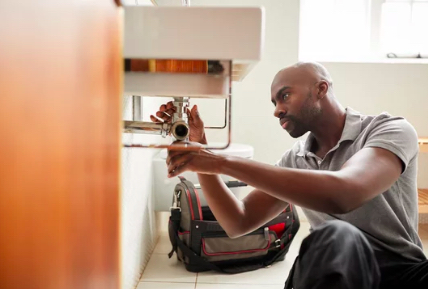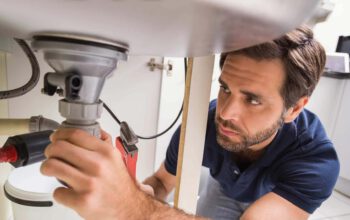Cleveland Plumber works affects the health and comfort of occupants, so they must have strong customer service skills to explain complex issues clearly and negotiate repair costs. In addition to technical knowledge, plumbers must be able to think critically and solve problems quickly. They must also have physical strength and stamina to lift heavy equipment and work in tight spaces.
Plumbers install plumbing systems in homes, businesses, and other settings. They must be able to read and interpret blueprints to install pipes and fixtures properly. This job requires extensive manual skills to work with tools and the ability to lift heavy objects and navigate tight spaces. Plumbers often work with hazardous materials, including sewage and chemicals, so they must follow strict safety protocols to prevent contamination and injury.
The installation begins with thoroughly inspecting the space to be worked on. The plumber checks the layout plan, measures the space, and determines the type and size of pipes and fittings needed. They then lay down plastic sheeting to protect the floor and surrounding area. The rough-in process involves:
- Installing the pipes below and above ground.
- Cutting into walls and ceilings.
- Connecting all the fixtures.
This is the most time-consuming part of the job, and it also requires the most skill. The plumber must ensure that all joints and connections are snug and secure, or water may leak out.
After the final inspection, the plumber tests all the pipes and fixtures to ensure they are working correctly. This includes flushing toilets, running faucets, and ensuring that there are no leaks. In some cases, plumbers must perform a quality assurance check, which may involve re-inspecting the pipes and fixtures to ensure they are in good condition.
In addition to installing new plumbing, plumbers repair and maintain existing systems. This can include fixing leaks, replacing worn parts, and adjusting valves. Some plumbers specialize in one or the other, depending on their experience and preferences.
A high school diploma is typically the minimum requirement to become a plumber. Some individuals choose to further their education by attending a technical or trade school, which offers programs designed to teach the skills needed for the job. Others opt to complete an apprenticeship, which provides on-the-job training and hands-on experience under the supervision of a journeyman plumber. Plumbers who wish to become licensed must pass a state exam.
Plumbing systems remove waste, supply hot and cold water, and regulate indoor climate through pipes, valves, fixtures, and appliances. They range from small residential sinks and toilets to large commercial piping networks and heating systems. A plumber’s job is to install, repair, and maintain these plumbing systems. They also inspect pipes and other components to ensure they work correctly and comply with building codes. This can involve using specialized tools to examine pipe conditions and taking samples of water quality for testing.
Many plumbing jobs are completed on an emergency basis, so plumbers must be available at short notice to respond to client calls. This can require them to work evenings, weekends, and holidays. It also means they may be required to travel between sites, depending on the location of the problem.
Plumbers also need good customer service skills as they often interact with clients, such as explaining complex issues in simple terms and providing cost estimates for plumbing services. They must also be reliable, punctual, and respectful of their client’s property when working on a job site.
Because of the health hazards associated with sewage pipes, plumbers must be familiar with relevant health and safety policies and procedures. This includes understanding the risks of handling human waste, which can contain infectious diseases such as cholera, typhoid, and hepatitis. It is also important for them to wear protective clothing and masks when dealing with sewage pipes to avoid exposure to harmful bacteria and viruses.
Some plumbers specialize in specific areas of plumbing, such as gas line installations and repairs. Others are more generalists and can work on various plumbing problems, including leaky faucets, clogged drains, and broken water heaters. They may need additional training or certification for more specialized jobs. For example, a plumber who works on gas lines must be licensed by the relevant authorities to work safely and accurately. This process usually involves passing a written and practical examination. The exam covers topics such as plumbing codes, regulations, and standards, as well as safe work practices and the use of specialized tools.
While some plumbing problems have easy at-home solutions, others require the skills of a professional. For example, if you have a leaking pipe causing water damage to your home, you need a plumber to fix it quickly. These professionals have the tools and experience to do the job right the first time. They also know how to spot potential issues, like a pipe at risk of bursting, and can take preventative measures to avoid costly repairs.
Depending on the type of leak, your plumber may need to replace or repair parts of your plumbing system. For example, if your pipe is old and worn out, they might replace it with a newer, more durable model. They might also install a water filter to improve the quality of your home’s water.
If you have a pipe leaking, the first step your plumber will take is to shut off the water supply to that area of your home. This will stop further water from entering your pipes and causing additional damage. Next, they’ll remove the damaged section of the pipe and either solder or cement a replacement section into place. They’ll use a special tool called a pipe repair sleeve to create a tight seal over damaged pipe sections.
Once the plumber has replaced or repaired the damaged part of your plumbing, they’ll test it to ensure there are no more leaks. They’ll also clean up the work area, ensuring no trace of their work is left behind.
If you have a leaky pipe, the best thing to do is to contact your local plumbers in Detroit as soon as possible. They’ll be able to come out and assess the problem and then provide you with a quote for the necessary repairs. In the meantime, you can try to dry off any surfaces affected by the leak and move any furniture or appliances away from the area if necessary. This will help prevent further damage to your home and belongings while you wait for the plumber to arrive.
A plumber’s job is to ensure the water system functions correctly and that any plumbing issues are resolved quickly. They are experienced in dealing with various problems, including clogged drains, water heater issues, and even running toilets. This makes them well-suited to diagnose problems and provide effective solutions for residential and commercial settings.
Using their training and experience, plumbers use a systematic approach to troubleshooting to find the cause of any problem. This process involves inspecting the area, identifying possible causes, and testing different solutions. This helps to eliminate ambiguity and find a long-lasting solution. Effective troubleshooting requires physical stamina and skill to work in tight spaces with heavy tools.
When a plumbing problem arises, it is important to take note of any clues or symptoms present. For example, if the water pressure seems to be lower than normal, this could indicate a problem with a part of the system or a leak somewhere in the pipework. It is also a good idea to check with neighbors if they are experiencing the same issue, as this may help identify the problem’s source.
After determining the root of the issue, plumbers apply a combination of knowledge, trial and error, and a process of elimination to arrive at the solution. They will then implement this solution and test it to ensure that it works correctly. If the test proves successful, the plumber will document and record all the steps taken to resolve the issue. This will help them to troubleshoot the problem if it occurs again in the future.
Many of these problems can be avoided by regular inspections and maintenance. In addition, implementing preventive measures such as reducing water usage, encouraging responsible drinking habits, and regularly flushing the tank can reduce the likelihood of plumbing problems. However, if the problem persists, it is best to seek professional help. Plumbers can quickly and efficiently diagnose and fix the problem without causing additional damage or overcharging for parts and labor.

